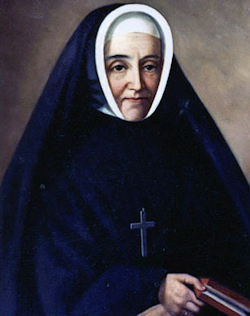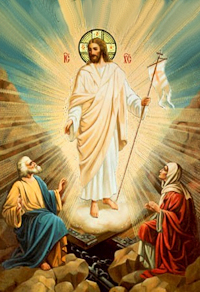Easter: April 18th
Friday of the Fourth Week of Easter
Other Commemorations: Bl. Marie-Anne Blondin, Virgin (RM; Optional Memorial in CAN)
» Enjoy our Liturgical Seasons series of e-books!
Pope Benedict XVI's Apostolic Jouney to the United States
Welcome Holy Father!
10:45 a.m. Pope Benedict XVI will address the United Nations, after an early morning flight to New York.
6 p.m. Prayer service with leaders from other Christian denominations at St. Joseph's Church in Manhattan.
For complete information see: Christ Our Hope
Jesus declared publicly: "Whoever believes in me, believes not in me but in him who sent me. And whoever sees me, sees him who sent me. I have come into the world as light, so that whoever believes in me may not remain in darkness. If anyone hears my words and does not keep them, I am not the one to condemn him; for I have come, not to condemn the world, but to save the world. The one who rejects me, and does not receive my word, already has a judge: the very word I have spoken will condemn him on the last day. For I have not spoken on my own authority; the Father who sent me has instructed me in what to say and how to speak. I know that his commandment is eternal life, and that is why the message I give, I give as the Father instructed me (Jn 12:44-50)."
Whoever believes in me, believes not in me but in him who sent me
Jesus cries out; He cries out just as someone who is saying words everybody should clearly listen to. His clamor synthesizes his saving mission, as He has come "to save the world" (Jn 12:47), but not on his own but in the name of "the Father who sent me and has instructed me in what to say and how to speak" (Jn 12:49).
It is not yet a month ago when we were celebrating the Paschal Triduum: how much present was the Father in the final hour, the hour of the Cross! As His Holiness John Paul II has written, "Jesus, overwhelmed by his foreknowledge of the trial waiting for him, alone before God, invokes him with his usual and tender expression of trust: ‘Abbá, Father’." The next hours clearly show the intimate dialogue of the Son with the Father: "Father, forgive them, for they do not know what they are doing" (Lk 23:34); "Father, into your hands I commend my spirit" (Lk 23:46).
The importance of this work by the Father and his Messenger, well deserves the personal response of he who is listening. This response is to believe, that is, a profession of faith (cf. Jn 12:44); faith that gives us the light — by the same Jesus — so that we shall not remain in darkness. But, he who rejects all these gifts and manifestations, and does not listen to those words "already has a judge: the very Word I have spoken" (Jn 12:48).
Therefore, to accept Jesus is to believe in, see and listen to the Father, not to be in darkness, to obey the command of eternal life. We certainly deserve Saint John of the Cross' rebuke: "[The Father] with this Word said everything in one go (...). Consequently, if you would like to ask God now, or should you pretend some kind of vision or revelation, it would not only be a piece of nonsense, but an offense for God, for not looking up only at Christ without asking for any other thing or novelty."
Fr. Julio César Ramos González SDB (Salta, Argentina), Contemplating Today's Gospel
Bl. Marie-Anne Blondin
 Esther Blondin was born on April 18, 1809 to a Catholic farm family in a rural community in Quebec, Canada. Her mother taught her to worship at the Eucharist and recognize Divine Providence. Her father taught her to have a strong faith and to be patient in times of suffering.
Esther Blondin was born on April 18, 1809 to a Catholic farm family in a rural community in Quebec, Canada. Her mother taught her to worship at the Eucharist and recognize Divine Providence. Her father taught her to have a strong faith and to be patient in times of suffering.
As a young woman, Esther worked as a domestic in her village to help her family. Drawn to vowed religious life, she joined the Congregation of the Sisters of Notre Dame. Illiterate, she learned to read and to write at age 22 as she went about the work of the Sisters. Ill health forced her to give up her dream of becoming a Sister of the Congregation of Notre Dame. After a time of rest, she was Esther became a teacher and then the principal of the school. Later she would train young teachers who taught in small country schools.
Healthy and mature, in 1850, Esther, with permission from the local Bishop, founded the Congregation of the Sisters of St. Anne and became the first Mother Superior, taking the name Marie-Anne.
In the following years, the congregation grew and expanded throughout Canada and the US New England states. And while the Congregation attracted more women seeking vowed religious life, the Foundress faced internal discord with the new chaplain assigned by the Church to oversee the group. She wrote, “As for me, my Lord, I bless Divine Providence a thousand times for the maternal care she shows me in making me walk the way of tribulations and crosses.” (Vatican document)
The foundress was deposed and relegated to the position of laundress, a position she accepted in order to minimize friction and distractions, helping to ensure the further development of the congregation. As is the way when one has trust in Divine Providence, Sister Marie-Anne was now able to personally teach the novices as they worked alongside of her.
One novice, surprised to learn that this simple woman was the foundress of the Sisters of St. Anne asked her why she, the foundress, was doing laundry. Her response:
“The deeper a tree sinks its roots into the soil, the greater its chances of growing, branching out, and bearing fruit.”
She also taught through her life and actions that “There is more happiness in forgiving than in revenge.”
On her deathbed, Sister Marie-Anne said to her sisters, “May Holy Eucharist and perfect abandonment to God’s will be your heaven on earth”. She went home to her “Good God” on January 2, 1890.
Sister Marie-Anne’s example of humility, obedience, forgiveness, and non-violence continue to speak to us today. We continue her mission to those whom God has put in our path, regardless of where the path is located.
In 2001, she was beatified by Pope St. John Paul II.
—Taken from Sisters of St. Anne
Highlights and Things to Do:
- Read more about Blessed Marie-Anne:
- Find out more about the Sisters of St. Anne which she founded.
- Listen to the CatholicSaints.info podcast about Bl. Marie-Anne.
- Read a short History of Her Cause






